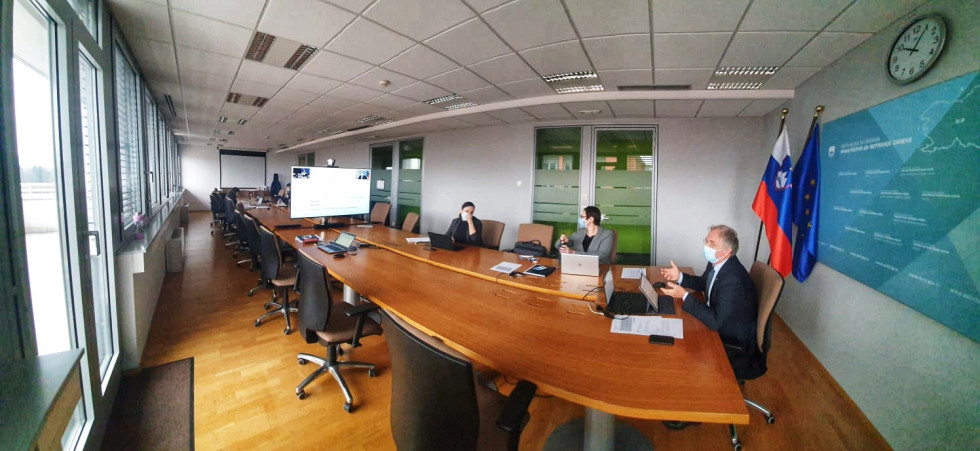By: UKOM
Minister of the Interior Aleš Hojs, accompanied by the delegation, participated at the informal videoconference of Home Affairs Ministers.
The first discussion revolved around the proposed Directive on the resilience of critical entities. The proposal aims to enhance the provision of services in EU Member States that are essential for the continuity of fundamental social and economic activities by way of increasing the resilience of critical entities providing such services. Under the proposed directive, each Member State is to adopt a national strategy to ensure resilience of critical entities and to carry out regular national risk assessments.
The proposal for a directive, which falls within the field of work of the Ministry of the Defence, provides a good basis for further discussions during the Slovenian Presidency when strengthening the resilience of the EU is to be one of the priorities on the agenda. According to Minister Aleš Hojs, “Slovenia supports the proposal for a revision of the Directive, which would expand the current scope to the cybersecurity as well.” “The COVID-19 pandemic has shown that our societies are vulnerable, therefore it is necessary to prioritise areas within the scope of the revised Directive. In addition, it is important to take into consideration Member States’ specificities.”
Enhancing cooperation on return and readmission was at the centre of the morning part of the session. In the discussion paper, the Portuguese Presidency stressed that the return of irregular migrants who are not entitled to reside in the EU is an essential part of the EU’s comprehensive efforts to manage migration, in particular to reduce irregular migration. Minister Aleš Hojs stressed that Slovenia, who is a consistent advocate of the need for a common EU approach in return, agrees with the Presidency’s approach to strengthen cooperation with the countries of North Africa, however based on a carrot and stick approach. Slovenia also supported the timely establishment of priority lists of countries. “Keeping in mind that the negotiations on the comprehensive migration policy are a lengthy process, we should make some progress in the field of return as soon as possible.” Based on the Commissions’ analysis, around 500 000 return decisions have been issued in the EU during the last year, out of which only 154 000 persons have been returned, which in Slovenia’s view points to the fact that existing return policy is ineffective.
In February 2021, the European Commission presented its factual assessment on readmission cooperation with partner countries in 2019 with respect to which Slovenia provided some recommendations. Among other things, clear criteria for qualitative assessment of cooperation with each country are important for Slovenia. The Minister noted: “A situation in which we are unable to return 600 persons to Morocco and Algeria because the authorities there are uncooperative in terms of identification and issuance of return documents may be insignificant for overall statistics, but it is a huge problem for Slovenia.”
The afternoon session was attended by the State Secretary, Dr Božo Predalič. The participants exchanged views on enhancing justice and home affairs cooperation between the EU and North African countries. State Secretary Predalič confirmed Slovenia’s support for the launching of a dialogue with the Southern neighbourhood: “We advocate for mutually beneficial partnerships, comprising of rights and obligations at both ends. At the same time, we should not duplicate existing initiatives, but rather ensure synergies between them.” “One way of responding to illegal migration and the proliferation of crime in North Africa and, consequently, their impact on the EU is to establish closer police cooperation with those countries,” noted Predalič and added that “the dialogue should be complemented by the conclusion of cooperation agreements between Europol and other agencies with North African countries as soon as possible.”
The Portuguese Presidency briefly presented the progress made in the negotiations on the Pact on Migration and Asylum. The Presidency and the European Commission provided information on the Schengen evaluation of Croatia, the European Commission provided information on the crossing of the borders between the COVID-19 pandemic, while Lithuania reported on proceedings against judges and prosecutors.
Source: gov.si

